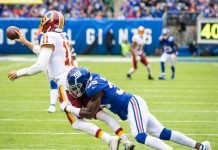The will they won’t they issue of sports betting within the United States is to come to a head in the coming months, with a final outcome in New Jersey’s quest to permit sports wagering, by striking down the current Professional and Amateur Sports Protection Act 1992 (PASPA), expected to find in favour of The Garden State.
A softening stance of the nation’s sports associations in recent times has seen the rising issue of the controversial one percent integrity fee, a caveat that sees the request of a percentage of sports betting handle, called a “royalty to the league” by NBA (National Basketball Association) commissioner Adam Silver.
Becoming the latest large-scale sports organisation to back the roll-out of sports wagering is the PGA Tour, who believe that it is essential to close down the multi-billion dollar illegal industry that is rife throughout the US.
“The prohibition of sports betting in the US has created a widespread black market”
Discussing how legalised, licensed and regulated sports betting could benefit the PGA Tour, and why a potential roll out needs to be beyond just brick and mortar casinos, Andy Levinson, its senior vice president of tournament administration, told SBC Americas: “We’ve studied sports betting at length, in order to understand the industry, the constituencies, the risks, etc.
“We’ve met with regulators, integrity experts, betting operators and others in the industry, and have collaborated with other sports leagues, particularly the NBA, to ultimately arrive at the position they have been advocating for years.
“The prohibition of sports betting in the US has created a widespread black market and we believe regulation is a more effective way of ensuring integrity of competition, protecting consumers and generating revenue for government, operators and leagues.
“We also believe that safe, responsible sports betting and gaming presents opportunities for fan engagement, and we are always looking for ways to further engage our fans.
“To that end, we also support mobile and live betting, as they not only offer greater opportunity for fan engagement, but if betting is limited to brick and mortar casinos, the black markets will not be eradicated, since consumers will still turn to illegal operators to bet on their phones.”
Collaborating with both the NBA and MLB (Major League Baseball) in its lobbying efforts, The Tour is also seeking that certain conditions be met, in addition to the one percent integrity fee.
The organisation also wants to reduce corruption by having input or control over the types of wagers on offer, in addition to requiring operators to use only official data.
“We believe the leagues should receive fair compensation for providing the source of the activity”
Addressing the necessity of an integrity fee, which it is argued could severely hamper a sportsbooks bottom line, Levinson stated: “We do support the leagues receiving a reasonable share of bets from the operators. The entire industry is built on games created by the leagues, and we believe the leagues should receive fair compensation for providing the source of the activity.
“Also, the leagues bear the integrity risks associated with betting. We note this is not a novel concept, as other jurisdictions internationally provide for fees to the leagues from the operators.”
Before concluding why the PGA Tour also seeks control on other matters: “From a PGA Tour standpoint, we believe it is necessary to have control over the types of wagers that can be made to alleviate the potential for corruption. This includes negative bets, like wagering a player will miss a short putt.
“Further, we believe the required use of official data is critical for ensuring integrity in competition. Betting markets are built on data, and we believe it is in the best interest of everyone involved in the system –consumers, operators, regulators, data distributors and leagues – to have one official source for that data: the leagues.
“This helps ensure the data that is used to create markets and settle bets is timely and accurate, which is necessary for a functioning system. Unofficial data could conflict with the official records of the leagues, creating uncertainty for consumers and others in the industry.
“We have invested millions of dollars in our ShotLink data collection system, and we believe that it’s unfair for others to be benefiting from the fruits of that labour through “courtsiding” and “scraping”. In fact, the Tour won a series of antitrust cases against a data distributor based on this argument, and we believe it is valid in this area as well.”














